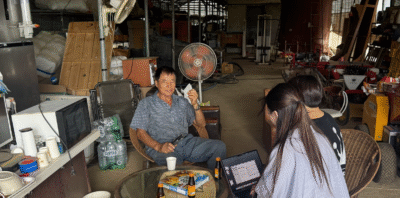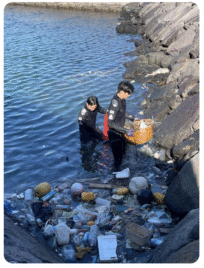Purpose and Background
Gangnam-gu, one of Seoul’s most vibrant districts, is well known for its stylish streets, trendy cafés, and bustling pedestrian zones. At first glance, it seems spotless. However, beneath this surface lies a hidden layer of litter that often goes unnoticed. Our goal in this project was to reveal and remove that hidden waste while raising public awareness about the reality of urban pollution.
This cleanup effort is part of Spiritus’ larger mission to build environmentally conscious communities. Through direct action and meaningful engagement with local residents, we aim to spark small changes that lead to lasting impact
Activity Overview
Armed with gloves, tongs, and biodegradable trash bags, our team covered a 0.99 km route through side streets, public walkways, and narrow alleys — areas where litter tends to accumulate. Over the course of just 20 minutes, we collected 85 pieces of trash. The route was chosen based on pedestrian traffic and locations known for hidden waste.

One of the most memorable moments came when a local resident stopped to thank us. They expressed genuine surprise at the amount of trash hidden in places they pass by every day. That brief interaction reminded us that environmental action is not only about cleaning streets but also about prompting reflection and inspiring change.
Waste Composition Analysis
The collected waste was categorized and analyzed as follows:
| Type of Waste | Quantity | Percentage |
|---|---|---|
| Paper | 22 | 25.9% |
| PET Bottles | 7 | 8.2% |
| Styrofoam | 7 | 8.2% |
| Cans | 3 | 3.5% |
| Miscellaneous (plastic wrappers, cigarette butts, etc.) | 46 | 54.2% (estimated) |

Paper waste was the most common type of litter we collected, likely from discarded flyers, receipts, and disposable drink holders. PET bottles and Styrofoam also made up a significant portion, reflecting the district’s heavy reliance on single-use packaging and takeaway products. The largest share came from miscellaneous waste such as cigarette butts and snack wrappers, showing how small, overlooked items accumulate over time and harm the environment.
Community Engagement and Response
Our cleanup sparked many positive interactions. Several passersby stopped to ask how they could join future events, and one resident shared that they had never realized how much trash had built up in their own neighborhood.
These conversations showed us that cleanup projects serve more than just a physical purpose. They also function as a psychological reset, helping people become more aware of their surroundings and more mindful of their habits.

Looking Ahead
This event marked our second cleanup project in Gangnam-gu, and it’s only the beginning. Spiritus plans to continue expanding these activities on a weekly basis, visiting new neighborhoods, collecting data on waste patterns, and building a volunteer network.
Our long-term goal is to foster a culture where public spaces are not only maintained by city workers but also cared for by the people who use them. Clean streets should be a shared responsibility. Through small but consistent actions, we believe we can create a lasting cultural shift toward environmental care and shared ownership of our surroundings.
Together, we are proving that meaningful change begins with simple actions — one piece of trash, one conversation, and one community at a time.
Discover more from Spiritus Blog
Subscribe to get the latest posts sent to your email.




Heard about Fortunetigerapp, and it does not hold back. It’s nice playing on the go with this app. Get it here: fortunetigerapp.